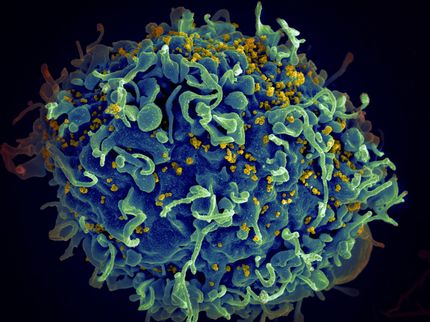HIV study leads to insights into deadly infection
Research led by the University of Adelaide has provided new insights into how the HIV virus greatly boosts its chances of spreading infection, and why HIV is so hard to combat.
HIV infects human immune cells by turning the infection-fighting proteins of these cells into a "backdoor key" that lets the virus in. Recent research has found that another protein is involved as well. A peptide in semen that sticks together and forms structures known as "amyloid fibrils" enhances the virus's infection rate by up to an astonishing 10,000 times. How and why these fibrils enhance infection and cause toxicity in the body's cells remains unknown.
The HIV fibrils known as "semen-derived enhancers of viral infection" (SEVI) have been studied by chemistry and pharmacology researchers at the University of Adelaide. The results of this work have now been published online in the journal Biochimica et Biophysica Acta .
"Amyloid fibrils play an important role in a number of prominent diseases, such as Parkinson's, Alzheimer's and others, and it's absolutely essential that we understand how they work if we have any hope of developing new drugs to stop them," says lead author Dr Ian Musgrave, from the University's School of Medical Sciences.
In laboratory studies, the team found that the HIV fibrils are toxic towards cells from the nervous system. They also found that even when the fibril is broken apart, its constituent elements continue to be toxic.
"This suggests that you can't just prevent one part of SEVI from aggregating and being toxic to cells. You need to shut the whole thing down or stop it from forming in the first place," Dr Musgrave says.
Researchers also tested the fibrils against another major type of body tissue, epithelial cells, and found they were not toxic to these cells.
"Epithelial cells are a major barrier to HIV entry. There have been theories that the fibrils can damage the epithelial layer, making it much easier for the virus to enter the body and infect the immune cells, but our findings show that healthy epithelial cells are resistant," Dr Musgrave says.
"This is an important finding because it could mean that the toxicity from the fibrils is dependent on the type of tissue they come in contact with," Dr Musgrave says.
"We now have a better understanding of the role of these protein enhancers in HIV infection. However, it's clear that much more research is needed in this area," he says.
Most read news
Other news from the department science

Get the life science industry in your inbox
By submitting this form you agree that LUMITOS AG will send you the newsletter(s) selected above by email. Your data will not be passed on to third parties. Your data will be stored and processed in accordance with our data protection regulations. LUMITOS may contact you by email for the purpose of advertising or market and opinion surveys. You can revoke your consent at any time without giving reasons to LUMITOS AG, Ernst-Augustin-Str. 2, 12489 Berlin, Germany or by e-mail at revoke@lumitos.com with effect for the future. In addition, each email contains a link to unsubscribe from the corresponding newsletter.


















































